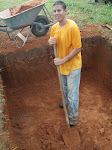It’s pretty well known to most folks that a missionary’s first months (and for some up to a year) are spent learning the language of their respective culture. For many, this is often a time of previously unknown frustration, timidity, and confusion in the realm of basic communication. It is also an inevitability that a language learner will commit more than a few humorous gaffes. The truth remains that you have to keep trying and make mistakes in order to improve. In all likelihood those around you will be quick to correct any major errors you commit or anything you’ve said offensive. Our language teacher Ba’Jepin was teaching us a few Aukan terms for using the restroom when he asked Taylor and I what do you call that?…... then uttered an ubiquitous (apparently) four-letter word with an unambiguous connotation familiar to any English speaker with innocence, curiosity and sincerity. We immediately rolled with laughter but were quick to tell him that that was an “ogii wootu”- a bad word and it would be advisable not to use it. While I have yet (at least to my knowledge) to make any major linguistical blunders I’m sure my time will come.
For Taylor and I “language school” has been a little more informal and unconventional than many of our colleagues in other parts of the world. Currently, a majority of our language learning is done at our house for three hours or so each day after breakfast and before lunch. We have two language teachers who can show up anytime on any day or not at all. (this is the norm as we quickly discovered). The rule is as follows: if they don’t come it’s expected and you move on to something else, if they show up, you stop everything and do language or whatever else with them for as long as they want to stay. Finding people to speak with isn’t difficult. We paddle across the river from our house in our canoe most days, buy freshly-baked bread and chat with people. In addition, our house often resembles a public park: people and especially kids come over at any and all times of the day to stare at us, plead to come into our house or play with them. Between periodic sessions with our language teachers, interactions with locals and hitting the English-Aukan dictionary we’ve come a long way in six weeks. Praise God!
Like most tribal languages, Aukan is a simple language in grammar, pronunciation and has a limited vocabulary. This makes it simple to learn and speak but can frustrate a guy like myself used to an English language containing over 500,000 words. One word often has up to ten meanings (not counting additional idioms) in Aukan. An example is the word Nyan. The meanings are as follows: to eat, to bite, to sting, to rot-off, eat away, corrode, to waste, hurt or pain, to enjoy, to celebrate, food, fruit, crop, meat of a fruit. While most words have fewer meanings than nyan the pattern remains. The biggest language peculiarity to us was the word Lobi. It has two meanings but they differ to a profound degree: to Love, to Like. We couldn’t understand how they can use the same word for such definitions as vastly different as loving vs. liking. I pondered (and continue to do so) how relationships work here when it comes to male-female communication. I’m glad I don’t have to explain what I really meant when I said, “mi lobi yu”. Anyway, I’ll leave it up to you to ponder some possible humorous scenarios.
One of the ways I’ve continued to learn Aukan is by using my Bible, the Aukan translation of the New Testament, and a dictionary to transliterate the headings of passages into English. What I found was the simplicity of the language gave surprisingly profound spiritual truths and perspectives. Here are some examples: Matthew 5:43 Love for Enemies is: Lobi den feyanti fi yu enke na yu mati translated as: Love your enemy as you would love your friend. Matthew 6, Giving to the needy is: yeepi taawan sondee fu suku balinen translated as: Helping all without seeking fame or notoriety. In Mark 16, the Aukan New Testament gives a few extra passage headings. In verse 15 it states: Masaa Jesesi gi den bakaman fi en wan gaan wooko, Jesus gives the Apostles one big task. There are countless examples of entire verses that will touch your heart to read them transliterated.
In learning a new language it’s easier to see the importance of sharing the gospel in a particular ethnic group’s native tongue and why it greatly amazed the diverse group at Pentecost in the first century to hear the word of God in their heart language. So I’m on my way to being proficient enough in Aukan to share Jesus and God-willing, very soon.
Thursday, March 5, 2009
Subscribe to:
Post Comments (Atom)





No comments:
Post a Comment